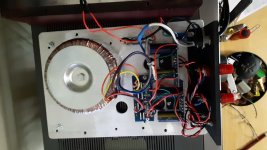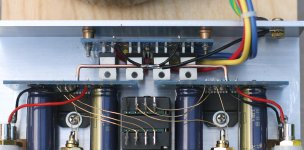I have an Audiosector lm3875 amp. When I hooked it up to my computer sound card (M-Audio delta 44) it made a loud buzz and ruined the sound card before I turned it off. Then I tried the amp with a couple portable devices, and it worked fine. The computer works fine with a JVC receiver, and worked fine with a previous Audiosector lm4780 amp. So I bought a new sound card (Focusrite2i2) buzz still there. I spent several hours reading about grounding, here and elsewhere. Tried grounding output ground to safety ground, immediate fuse blow. I'm stumped. You guys are a LOT smarter about this than I am. HELP!
Its not easy at a distance  I'll ask some questions for you to think about and hopefully others can step in as well.
I'll ask some questions for you to think about and hopefully others can step in as well.
The first thing to do is make sure your amp hasn't got some unwanted voltage present.
You need to tell us whether the amp alone has a mains ground. In other words is the chassis grounded via its mains lead or power supply?
Is there any measurable AC or DC voltage present between the amp chassis and mains ground and/or between the amp input ground (its RCA sockets) and mains ground?
Repeat the measurement but this time between your PC's ground and the amp. Any voltage present?
Which fuse blows? Is it the amp, the PC or the soundcard one?
Fuses blow because of excess current. If it is the amp fuse blowing then maybe the PC setup is sending the crazy in some way... high frequency instability. That shouldn't damage the soundcard though.
If it really does all work OK with a JVC receiver then look and see if the receiver is grounded. Has it a three core mains lead? If not then just try grounding it as a test. Does it still work OK with the PC. That really clears the PC setup side of things leaving the chip amp as culprit.
The first thing to do is make sure your amp hasn't got some unwanted voltage present.
You need to tell us whether the amp alone has a mains ground. In other words is the chassis grounded via its mains lead or power supply?
Is there any measurable AC or DC voltage present between the amp chassis and mains ground and/or between the amp input ground (its RCA sockets) and mains ground?
Repeat the measurement but this time between your PC's ground and the amp. Any voltage present?
Which fuse blows? Is it the amp, the PC or the soundcard one?
Fuses blow because of excess current. If it is the amp fuse blowing then maybe the PC setup is sending the crazy in some way... high frequency instability. That shouldn't damage the soundcard though.
If it really does all work OK with a JVC receiver then look and see if the receiver is grounded. Has it a three core mains lead? If not then just try grounding it as a test. Does it still work OK with the PC. That really clears the PC setup side of things leaving the chip amp as culprit.
The amp has a mains ground, but I lifted it with no change. (The JVC doesn't have mains ground). The amp boards aren't grounded to the chassis. Actually, the fuse blew when I tried grounding them.
Output ground to chassis 15VDC 11VAC. Same from input ground to chassis. 1.3mVDC input to input ground. 57 mVDC output to output ground.
9mVDC from computer output ground to amp input ground.
PC ground=amp ground.
The amp fuse blew with no input, just grounding output ground to chassis.
Grounding the JVC does nothing.
Output ground to chassis 15VDC 11VAC. Same from input ground to chassis. 1.3mVDC input to input ground. 57 mVDC output to output ground.
9mVDC from computer output ground to amp input ground.
PC ground=amp ground.
The amp fuse blew with no input, just grounding output ground to chassis.
Grounding the JVC does nothing.
Thanks for all the measurements... hmmm, it is very difficult to make sense of tbh.
I would say that grounding the amp chassis and then the fuse blowing suggests some issue.
15 volts DC, 11 volt AC that is present between output ground and chassis... the next step I would take would be to see if that voltage is 'real' or just voltage the chassis is floating to.
You can check how 'real' it is by connecting a resistor between those points and seeing if the voltage collapses to nothing... or whether the voltage is maintained. A 1k 0.25W would be OK although the value isn't critical.
If the voltage is maintained then you have a construction problem somewhere within the amp.
If the voltage collapses (it should) then the chassis is just floating however that then leaves the question of why it pops the fuse when you do ground it. I would suspect some kind of instability at work in that case.
Are the input grounds (or any part of the circuitry) tied to the chassis?
The other measurements sound OK.
I would say that grounding the amp chassis and then the fuse blowing suggests some issue.
15 volts DC, 11 volt AC that is present between output ground and chassis... the next step I would take would be to see if that voltage is 'real' or just voltage the chassis is floating to.
You can check how 'real' it is by connecting a resistor between those points and seeing if the voltage collapses to nothing... or whether the voltage is maintained. A 1k 0.25W would be OK although the value isn't critical.
If the voltage is maintained then you have a construction problem somewhere within the amp.
If the voltage collapses (it should) then the chassis is just floating however that then leaves the question of why it pops the fuse when you do ground it. I would suspect some kind of instability at work in that case.
Are the input grounds (or any part of the circuitry) tied to the chassis?
The other measurements sound OK.
Is this LM3875 amp bridged by any chance? I.e. both the speaker(+) and speaker(-) output are driven by separate LM3875 and the speaker is connected between the two? If so, you need to use a balanced input when you measure the amp.
If it's just a single LM3875, there's no reason it should blow fuses or destroy sound cards. It makes me wonder if the transformer has failed and is showing high leakage between primary and secondary. Just a thought.
Tom
If it's just a single LM3875, there's no reason it should blow fuses or destroy sound cards. It makes me wonder if the transformer has failed and is showing high leakage between primary and secondary. Just a thought.
Tom
First, thanks for all your efforts.
The voltage does not drop with a sinking resistor. (The amp is isolated from the chassis. In Peter's instructions, he mounts the amp on wood, so I think the chassis is just a holder for the amp?)
PRR, that is the correct amp. I endeavored to build it per instructions, but must have done something wrong. I believe the chips are isolated, don't see any metal on the case.
The amp is not bridged. Transformer secondaries 28V.
I believe the chip is isolated, so doesn't need an insulator, per instructions.
The voltage does not drop with a sinking resistor. (The amp is isolated from the chassis. In Peter's instructions, he mounts the amp on wood, so I think the chassis is just a holder for the amp?)
PRR, that is the correct amp. I endeavored to build it per instructions, but must have done something wrong. I believe the chips are isolated, don't see any metal on the case.
The amp is not bridged. Transformer secondaries 28V.
I believe the chip is isolated, so doesn't need an insulator, per instructions.
Attachments
Even though the LM3875TF is isolated, it still needs heat sink compound between the back face and heat sink. Just make sure your metal chassis goes to the safety ground on the power in.
I can't seen in the pic, but are the RCA inputs isolated from the metal chassis.
PD does ground the power supply to the heatsink (chassis) in this pic.
I can't seen in the pic, but are the RCA inputs isolated from the metal chassis.
PD does ground the power supply to the heatsink (chassis) in this pic.
Attachments
PD LM3875 instructions.
https://audiosector.com/wp-content/uploads/2019/01/LM3875-kit-instructions.pdf
https://audiosector.com/wp-content/uploads/2019/01/LM3875-kit-instructions.pdf
The voltage does not drop with a sinking resistor. (The amp is isolated from the chassis. In Peter's instructions, he mounts the amp on wood, so I think the chassis is just a holder for the amp?)
The fact the voltage is maintained tells us that the chassis has a conductive return path back to the power supply. You are saying the voltage is maintained across the test resistor.
That needs investigating.
Well, I thought I had it. I found a short from one of the transformer secondaries to ground through the outer surface of the transformer. I couldn't see it, but removing the transformer from the chassi removed the short. I cut a sheet of thin plastic for an insulator, and the short is gone. The 15V to the chassis is gone. The buzz is still there. Time for a beer.
That is some progress anyway  Perhaps a metal burr or something on the chassis has penetrated the insulation of the secondary.
Perhaps a metal burr or something on the chassis has penetrated the insulation of the secondary.
Buzzing from the speakers is a different issue and you would need to be looking at wiring layouts and grounding.
If it is mechanical buzz from the transformer then that is a different problem altogether.
Buzzing from the speakers is a different issue and you would need to be looking at wiring layouts and grounding.
If it is mechanical buzz from the transformer then that is a different problem altogether.
- Status
- This old topic is closed. If you want to reopen this topic, contact a moderator using the "Report Post" button.
- Home
- Amplifiers
- Chip Amps
- deadly buzzing on lm3875 amp


